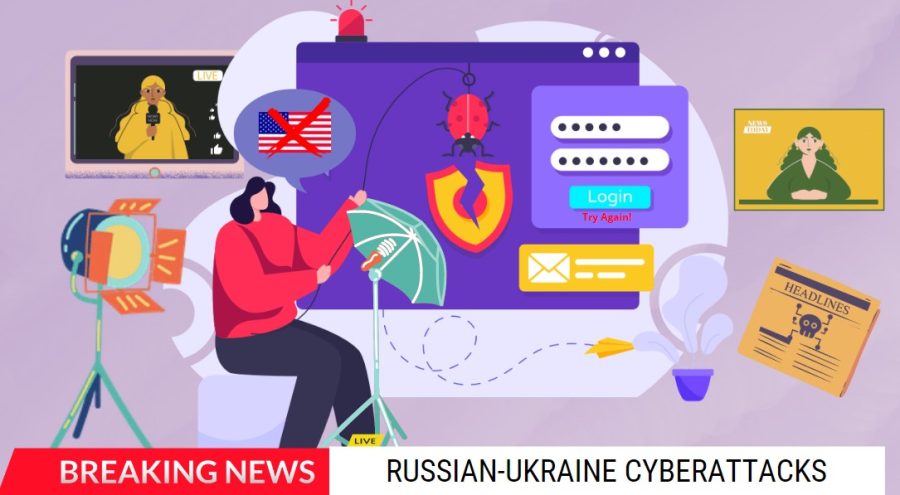Cyberattacks on the Rise Amidst the Russia-Ukraine War
As the Russian-Ukraine War continues over in Eastern Europe, so does technological warfare continues rising between the U.S. and Russia.
Apr 10, 2022
As countries allied with the North Atlantic Treaty Organization and other members of the European Union continue to add stricter sanctions on Russia, Russian-state news outlets have covered a different side of the war as the Kremlin has recently accused the United States of attacking the country’s infrastructure in a series of cyberattacks in order to dismiss the invasion going on Ukraine.
The Russian ministry stated, “Fake information is being disseminated on the Internet with the aim of disorienting and demoralizing Russian society, discrediting the actions of the Armed Forces of the Russian Federation and government agencies.” The U.S. government has rejected these statements made by the Russian Ministry of Foreign Affairs.
As the Russia-Ukraine War enters the second month of invasion, the White House has warned major American companies and others overseas about potential cyber-attacks launched by Russia in an attempt to shut down any critical systems.
The Cybersecurity and Infrastructure Security Agency has introduced a “Shields Up” guidance for all organizations on how to report and stop any malicious cyber activity defined by the CISA after the recent step taken by Russia.
More countries are taking action toward securing their networks as Russia has already launched multiple cyberattacks since the start of the war. Earlier this week, all Ukrainian government websites were down along with the Parliament’s Foreign and Defense Ministries. The Biden administration had gathered the Central Intelligence Agency to uncover the hackers who were behind the attacks that were tied to the Russian government.
While the Kremlin has denied any involvement with the attacks, President Biden said he was “prepared to respond” if Russia launches attacks on American companies and its energy and oil infrastructure.
After the U.S. attacked Russia for its war aggression on Ukraine, it stopped importing oil barrels from the country. Many agencies, including the Federal Bureau of Investigation, have kept investigating more cyberattacks after the decision. Top U.S. cybersecurity officials, including Director of the CISA Jen Easterly, Cyber Director Chris Inglis and Deputy of National Security Anne Neuberger have warned that the Kremlin might target the energy and oil industries to further weaken the U.S. critical infrastructure.
“It’s crazy to think how the whole Russia-Ukraine War is going on and how cyberattacks are being launched into Ukraine trying to undermine any alerts through areas like Bucha where humanitarian corridors are being put in place along with Mariupol as well,” freshman Sofia Perez said.
The FBI has also reported five U.S. energy companies having Russian internet addresses being scammed in their networks, possibly a cyberattack.
As Russian President Vladamir Putin still calls the conflict a “special military campaign”, multiple pro-Kremlin propaganda channels support the idea by criticizing the Biden administration on the assertion that it is Russia responsible for higher gas prices globally.
“I personally think that Russia is trying to isolate its citizens from what’s going on in real life such as shutting down social media apps like Facebook and threatening websites like Wikipedia just for their own personal gain,” freshman Christopher Arriaza said.
Head of Britain’s Government Communications Headquarters spy service Jeremy Fleming said observations show that “Russia’s cyber actors are looking for targets in the countries that oppose their actions” in Ukraine.













